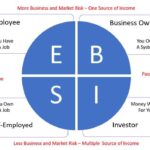When people feel like they’re not earning enough money, the default solution society offers is: “Go back to school.” If you’ve already earned a bachelor’s degree and aren’t seeing the paycheck you hoped for, the advice often becomes, “Get your master’s.” And if that doesn’t do it? You guessed it—go for your Ph.D. Surely then the dollars will follow.
But let’s challenge that line of thinking.
It’s not that education isn’t valuable. It absolutely is. But the assumption that more formal education automatically leads to more income? That’s not always true—and in many cases, it’s downright inefficient.
The Traditional Path: Climbing the Credential Ladder
Employers often encourage their staff to pursue additional degrees. Some even offer tuition reimbursement, which feels generous on the surface. But dig a little deeper, and you’ll realize that this strategy often reinforces an employee mindset: one that believes credentials equal value.
What this model overlooks is speed, flexibility, and most importantly—real-world problem-solving. Advanced degrees can take years to complete, cost tens (or hundreds) of thousands of dollars, and may not teach you the practical skills required to solve the problems that exist right now. In an economy where speed, adaptability, and results are rewarded, the academic route can be a long detour with no guaranteed payoff.
Related Post: College is No Longer a Guarantee for Success
The Entrepreneurial Alternative: Solving Problems for Profit
Entrepreneurs think differently.
Instead of asking, “What degree do I need to earn more?” they ask, “What problem can I solve that people will pay for?” This mindset is fundamentally more efficient, more empowering, and often more lucrative.
And when entrepreneurs encounter gaps in their knowledge, they don’t automatically sign up for a multi-year degree program. They seek out knowledge that’s:
- Relevant
- Actionable
- Immediately applicable
That might mean reading a book, attending a short workshop, watching a YouTube tutorial, or hiring a coach. In some cases, it might mean finding a mentor or collaborating with someone who already has the expertise they need. Entrepreneurs know that they don’t have to know everything—they just need to know how to get the answers or assemble the right team.
Related Post: 8 Simple Ways Entrepreneurs Think Differently Than Most People
Education Versus Execution
Let’s be clear: education isn’t the enemy. But placing formal education on a pedestal can create a false sense of security. It delays action. It fosters perfectionism. And it can trick people into thinking they’re progressing when really, they’re just preparing endlessly.
Entrepreneurs don’t wait until they feel “ready.” They roll up their sleeves and launch a pilot. They test ideas on a small scale. They experiment, adapt, and learn in the real world—not just the classroom.
As Naval Ravikant, angel investor and entrepreneur, famously said:
“The most important skill for getting rich is becoming a perpetual learner. You have to know how to learn anything you want to learn.”
That means knowing how to source knowledge efficiently—not just earn degrees.
Real-World Examples: Degrees Optional
Consider the stories of many successful founders:
- Steve Jobs dropped out of college.
- Richard Branson never went.
- Sara Blakely, founder of Spanx, started her empire with $5,000 and zero business training.
Related Article: 50 super successful college dropouts
What they had in common wasn’t an Ivy League pedigree—it was the ability to see an unmet need and the guts to go solve it.
That same opportunity is available to you.
If you’re feeling stuck financially, don’t assume the answer lies in more credentials. Ask instead:
- What valuable problem can I solve?
- What skills or knowledge gaps do I need to close?
- What’s the fastest way to get that knowledge?
And then go solve that problem better than anyone else.
Take Small Steps, Think Big
The beauty of the entrepreneurial mindset is that it invites you to start where you are. You don’t need permission. You don’t need perfect timing. And you certainly don’t need another degree to start earning more.
Begin with a side hustle. Test an idea on weekends. Learn by doing. Use failure as feedback. Over time, you’ll discover that income is a result of value creation—not just academic credentials.
Final Thoughts
So, are you operating with an employee’s mindset—climbing the ladder rung by rung, degree by degree? Or are you embracing the entrepreneur’s mindset—looking for problems to solve and seizing opportunities to learn on your terms?
It’s not about shunning education. It’s about expanding your definition of it.
What’s one problem you’ve observed in your community or industry that you could begin solving today—even without an advanced degree?












